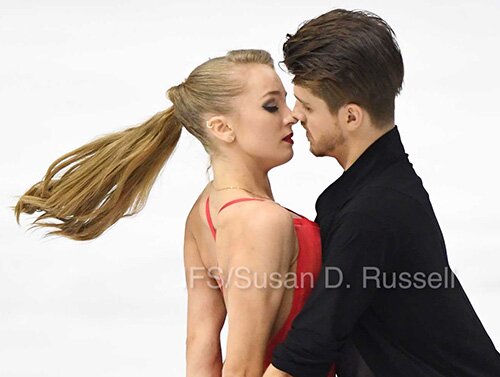
Russian teams had dominated the international ice dance scene for decades, but not so anymore. It has been seven years since Oksana Domnina and Maxim Shabalin were crowned World champions in 2009, the last Russian team to claim the title. Since then, Russia has captured only two medals at major competitions — Ekaterina Bobrova and Dmitri Solovyev won bronze at 2013 Worlds, and an Olympic bronze which went to Elena Ilinykh and Nikita Katsalapov in 2014.
The promising but erratic Ilinykh and Katsalapov split soon afterwards, and the usually consistent Bobrova and Solovyev have not competed at Worlds since 2013. With Bobrova and Solovyev’s retirement on the horizon and Ilinykh and Katsalapov failing to break through with their new respective partners, Russia is in need of a strong team that can challenge for World podium spots.
Alexandra Stepanova, 21, and Ivan Bukin, 23 are the frontrunners to assume that mantle. Prior to this season, the Moscow-based duo still had a junior look, even though they have been competing on the senior circuit since 2013. But this year they have taken a big step forward.
At Finlandia Trophy last October, Stepanova and Bukin performed polished programs that earned them the top step of the podium. Following a fifth-place finish at Skate Canada, they and their coaches, Irina Zhuk and Alexander Svinin, focused on some of the details of the free dance, such as the entry to a lift, the circular step sequence and their speed.
The work paid off. Stepanova and Bukin captured bronze at their second Grand Prix event in Beijing earning new personal best scores. “The medal at Cup of China is one of our most valuable achievements, because we competed against a strong field and skated our free dance well,” Bukin said. “This was a small victory, but we see it as a beginning.”
In China, the duo cracked 70 points in the short dance and 100 points in the free for the first time in their career. “These records show us that we are really competitive,” Stepanova said. “The coaches always told us, ‘guys, you can do it, skate, skate.’ So we skated, looked at our scores and asked ourselves at which level are we? The scores we received at the Grand Prix events now provide an answer to this question and show us that we can compete with the other couples.”
Stepanova and Bukin’s programs this season are an important step towards achieving this new level. Their coaches turned to five-time U.S. ice dance champion Peter Tchernyshev, who returned to Russia following his retirement from competitive skating, to choreograph the free dance to “Libertango,” “Verano Porteno” and “Primavera Portena” by Astor Piazzolla.
“Peter helped us a lot. At first we liked the music and then we got carried away by the work,” Stepanova said of the Argentine Tango. “During the process of designing the program, we changed some of the music. With our new programs we wanted to show that we are not juniors anymore and that people will look at us as a grown up couple. This was our goal.”
Bukin agreed. “The Tango is inner passion and we worked a lot on bringing out the emotions so the spectators feel them when watching our performances,” he said. “We’ve worked a lot on and off the ice with our regular choreographer Aliona Samarskaia. The program is technically and emotionally difficult and we still have to work on it. But we really like it — you can say that we live it. We really want to show a real Tango, a dance of passion.”
Zhuk choreographed the short dance, a mix of Blues and hip-hop. “We have dreamed of trying hip-hop, and, finally, the time has come that we could do this kind of program. We worked with professional dancers it came out great — comfortable and fun,” Bukin explained
Stepanova said she and Bukin want to stand out and have audiences be involved in their performances. “For example, when the rules for the twizzles changed we used the shoot-the-duck position, the most difficult variation. The same goes for the hip-hop. We thought that not so many couples would choose the hip-hop.”
The duo is also getting some support from the 1988 Olympic ice dance champions, Natalia Bestemianova and Andrei Bukin, Ivan’s father. “Before a competition my dad keeps silent and tries not to involve himself in our work with our coaches,” Bukin said. “He and Natasha come to us only after a competition. We are very happy that they help us. They are, after all, Olympic champions. They have gone through the wringer and understand everything perfectly. It is always interesting to listen to what they tell us. Most importantly, they can not only tell us something, but also they can show us.”
Stepanova and Bukin placed second at the 2017 Russian nationals and are assigned to the World Championships in late March. But there will be no time for the 2013 World junior champions to relax with berths at the 2018 Olympic Winter Games on the line in Helsinki.
RELATED CONTENT: 2017 WORLD CHAMPIONSHIPS